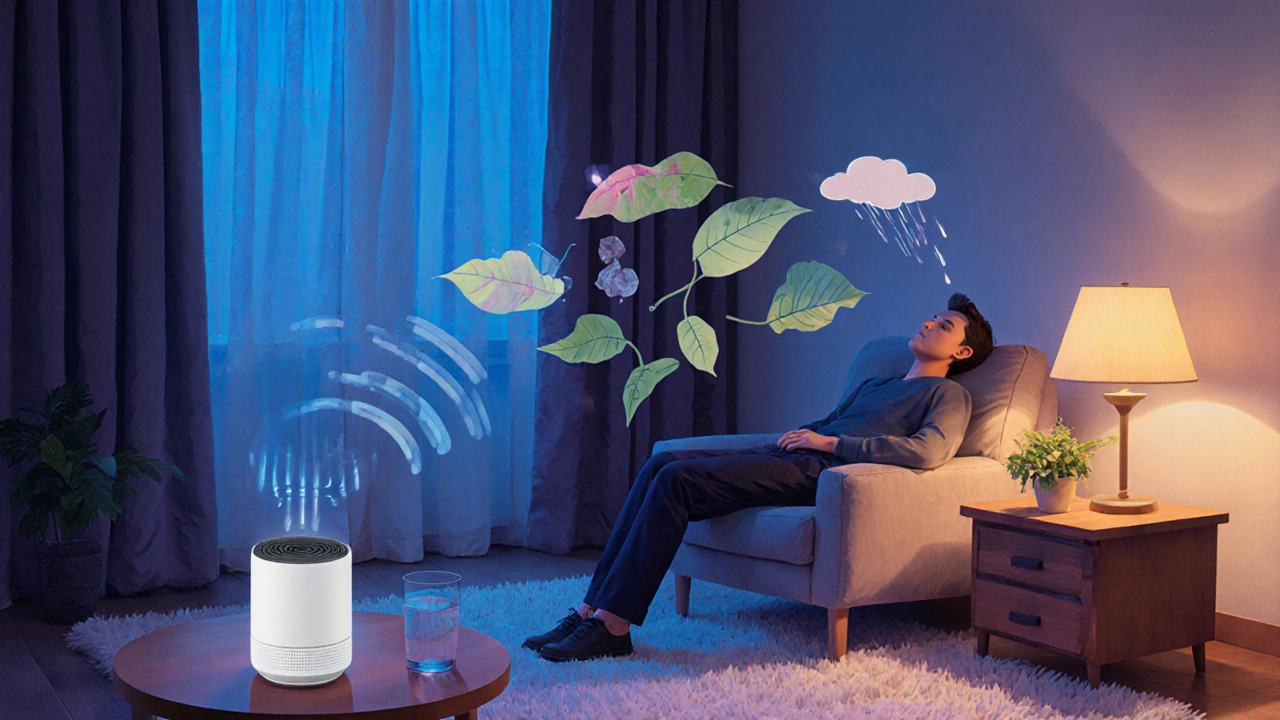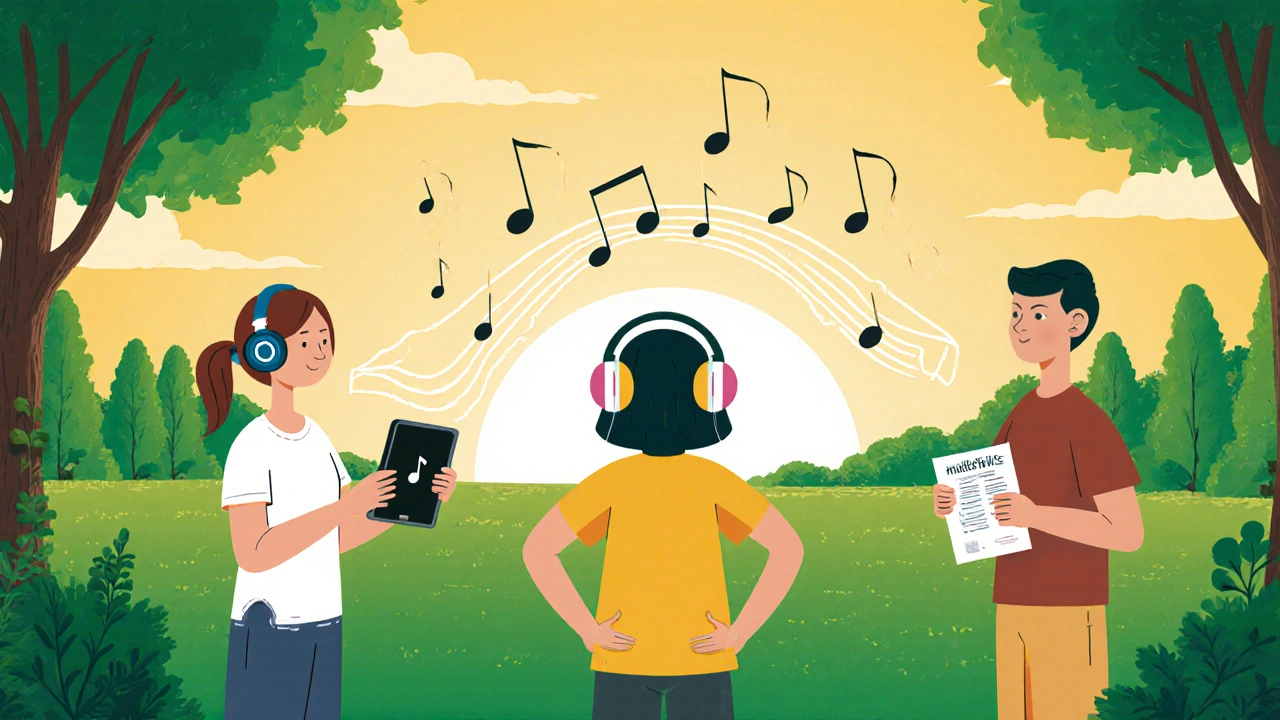 17
Oct,2025
17
Oct,2025
When someone you love hears a constant ringing in the ears, it can feel like a silent battle you’re watching from the sidelines.
Tinnitus is a condition where a person perceives sounds such as ringing, buzzing, or hissing without any external source. It affects millions worldwide and shows up at any age, often deepening stress and frustration for both the sufferer and their support network.
Understanding What Triggers Tinnitus
Knowing the common causes helps you explain the situation and calms fears of the unknown.
- Noise exposure: Loud concerts, power tools, or prolonged headphone use can damage tiny hair cells inside the inner ear.
- Medication side effects: Some antibiotics, chemotherapy drugs, and high‑dose aspirin are known to provoke ringing.
- Ear infections or wax buildup: Blockage alters pressure, creating phantom sounds.
- Age‑related hearing loss: As the auditory system ages, the brain may “fill in” missing input with noise.
- Stress and anxiety: Heightened nervous system activity can amplify perceived sounds.
Common Myths and Facts
Many people believe that tinnitus is always a sign of permanent hearing loss. In reality, up to 30% of cases are temporary and resolve once the trigger (like loud noise) is removed.
Another myth is that “covering” the ears with cotton will stop the sound. This actually isolates the ear and can make the brain amplify internal noise.
Finally, some think that medication is the only treatment. While drugs can help with associated anxiety, the most effective approaches combine sound masking, counseling, and lifestyle changes.
Why Support Matters
The constant hum can wear down a person’s mood, concentration, and even sleep. Studies from the Australian Hearing Council (2023) show that people with untreated tinnitus report a 40% higher chance of depression. Your calm, informed presence can break that cycle.

Practical Ways to Help
Below are concrete actions you can take today.
- Listen without judgment. Let them describe the sound. A simple “I hear you” validates their experience.
- Encourage professional evaluation. Suggest a visit to an Audiologist or ENT specialist who can run hearing tests and rule out treatable causes.
- Create quiet zones. Reduce background noise by turning off the TV, using soft furnishings, and limiting sudden loud sounds.
- Introduce gentle sound therapy. White‑noise machines, soft music, or nature apps can mask the ringing and give the brain a “real” sound to focus on.
- Teach stress‑relief techniques. Guided breathing, progressive muscle relaxation, or short mindfulness sessions have been shown to reduce tinnitus severity in up to 30% of participants.
- Help with lifestyle tweaks. Encourage regular exercise, a low‑salt diet, and limiting caffeine, all of which can lower overall nerve excitability.
- Stay patient. Fluctuations are normal; some days will feel better than others.
A White‑noise machine produces a gentle, steady sound that helps mask the ringing and makes it less intrusive.
A Mindfulness app guides short breathing exercises that calm the nervous system, often lowering perceived volume of the tinnitus.
Sound therapy uses specially designed audio tracks to retrain the brain’s response to phantom sounds.
Self‑Care for the Caregiver
Supporting someone else can drain you. Keep your own health in check.
- Set boundaries - a 10‑minute “check‑in” window prevents burnout.
- Seek your own support - join a caregiver forum or talk to a therapist.
- Maintain hobbies - staying engaged helps you stay resilient.
Red‑Flag Signs: When to Seek Immediate Medical Attention
If any of these appear, call a doctor right away:
- Sudden onset of ringing after a head injury.
- Accompanying dizziness, balance loss, or facial weakness.
- Rapidly worsening hearing loss.
- Persistent pain or drainage from the ear.

Helpful Resources and Tools
Technology can make coping easier.
| Technique | Primary Benefit | Ease of Use |
|---|---|---|
| White‑noise machine | Masks ringing | High |
| Mindfulness app | Reduces stress‑related amplification | Medium |
| Ear protection (earplugs) | Prevents worsening from loud environments | High |
| Sound therapy (specialized headphones) | Retrains brain’s auditory pathways | Low‑Medium |
| Professional counseling | Addresses anxiety and depression | Medium |
Popular apps such as “myNoise” or “ReSound Relief” let users customize background sounds to match their personal tinnitus profile.
Joining a support group can provide emotional relief and practical advice from others facing the same challenge.
Long‑Term Outlook and Adaptation
With consistent support, most people learn to “live with” the ringing rather than fight it. Over time the brain can re‑prioritize the phantom sound, making it less noticeable during daily activities.
Encouraging a routine that includes regular check‑ups, stress‑relief practices, and gentle sound exposure can dramatically improve quality of life.
Frequently Asked Questions
Can lifestyle changes really reduce ringing?
Yes. Reducing caffeine, managing stress, and protecting ears from loud noises have all been linked to lower tinnitus intensity in clinical observations.
Is there a cure for tinnitus?
A definitive cure is rare, but many people achieve significant relief through sound therapy, counseling, and treating underlying causes.
How often should my loved one see an audiologist?
At least once a year for a check‑up, or sooner if symptoms suddenly change.
Can children experience tinnitus?
Yes, especially after ear infections or exposure to loud environments. Early intervention can prevent long‑term distress.
What should I avoid doing when trying to help?
Don’t dismiss the sound as “just in your head,” avoid suggesting loud music as a remedy, and don’t pressure them to “just ignore it.”






Listening to the constant hum is like living inside a never‑ending echo chamber, it drifts through every quiet moment. When you sit beside someone with tinnitus, you have to learn to hear the silence between the rings. The brain will eventually learn to quiet the phantom noise if we give it gentle reminders. Think of it as a meditation on patience, even if the sound won’t stop.
They don’t tell you that the same labs pushing the “miracle” pills are the ones that hide the truth about permanent ringing. It’s a classic case of the deep‑state trying to keep us dependent on their sound‑masking tech. Only by refusing the snake oil can we expose the real cause-ourselves being hustled into silence. The patriots out there know the battle isn’t just in the ear, it’s in the mind.
Honestly, most people think tinnitus is just “in your head,” but the science says otherwise – it’s a real neurological response. You can’t just blame stress; a lot of studies back that up, so stop acting like you’re the only one dealing with it. :) The key is consistent sound therapy and not ignoring the problem.
Exactly, and while we’re at it, the media loves to simplify the whole thing into a “just relax” meme. 🇺🇸🦻 Let’s keep it real – proper ear protection and professional help are non‑negotiable, not some trendy hashtag.
Sounds like a nightmare, man.
What you’re calling a “deep‑state” plot is really just a lack of personal responsibility. Most of these sufferers ignore basic lifestyle tweaks and then blame big pharma for the lingering buzz. The truth is simple: if you don’t protect your ears, you’ll hear that ringing forever. So before you point fingers, look at your own habits.
The journey through the endless static can feel like walking a tightrope over a stormy sea, every step echoing louder than the last. Yet, within that chaos lies a chance to reshape how we perceive even the smallest sounds around us. It’s a dramatic shift, but one that builds inner resilience without a single shout.
Well, let me just unpack the whole tinnitus saga from every angle because you seem to need a full‑blown lecture. First, the brain is a master of filling gaps, and when it receives incomplete auditory input it conjures phantom tones like a broken radio left on mute. Second, the emotional weight of constantly hearing that high‑pitched whine can seep into every facet of life, from work productivity to bedtime rituals. Third, many caregivers underestimate the silent fatigue that comes from simply “listening” to a loved one’s complaints without offering tangible help. Fourth, you can’t just hand them a white‑noise machine and call it a day; there’s a whole protocol involving audiology evaluations, stress‑management, and sometimes cognitive‑behavioral therapy. Fifth, the myth that caffeine is the sole villain is half‑true – it can exacerbate the perception but isn’t the root cause. Sixth, lifestyle tweaks like regular exercise and a balanced diet actually recalibrate neural firing patterns, reducing the intensity over weeks. Seventh, sound therapy isn’t a one‑size‑fits‑all; you need to customize frequencies to match the individual’s tinnitus profile, otherwise you risk aggravating it. Eighth, the social stigma surrounding “invisible illnesses” often makes sufferers retreat, which only fuels the phantom sound. Ninth, caregivers often forget to set boundaries, ending up burned out and less effective, so short check‑ins are crucial. Tenth, technology offers apps that let you generate personalized ambient soundscapes, and they’re surprisingly affordable. Eleventh, support groups provide a community where shared stories validate experiences and reduce isolation. Twelfth, it’s essential to monitor any red‑flag symptoms like sudden hearing loss or dizziness and act fast. Thirteenth, don’t underestimate the power of mindfulness; a few minutes of breathing can lower the brain’s alarm system. Fourteenth, remember that patience is not passive – it’s an active, compassionate engagement with the person’s reality. Finally, keep reminding yourself that while the ringing may never fully disappear, you can learn to live with it in a way that doesn’t dominate every conversation.
Thank you for that thorough breakdown; it really underlines how a multi‑pronged approach can shift the experience from overwhelming to manageable. Encouraging regular audiology check‑ups, combined with gentle sound therapy and mindful breathing, creates a supportive framework for both the patient and the caregiver.
Totally get it, this stuff can be rough – just keep it simple and stay consistent.
My heart truly goes out to anyone navigating this relentless noise; remember, every small victory – a night of quieter sleep or a moment of calm focus – is a triumph worth celebrating.
people think tinnitus is just a minor issue but it can dominate daily life its not something to ignore it affects mental health and relationships and everyone should take it seriously
Agreed. The evidence shows that early intervention and consistent lifestyle adjustments significantly reduce symptom severity. Maintaining clear communication with healthcare professionals ensures the best possible outcomes.
Ah, the endless ring!-a siren of the soul that refuses to be silenced… Yet within that relentless echo lies a secret: the mind’s own power to rewrite the soundtrack of existence. Embrace the chaos, dear reader; transform the discord into a symphony of resilience!!!
In closing, I cordially applaud your perseverance and encourage you to persist with disciplined self‑care, steadfast optimism, and unwavering commitment to therapeutic strategies, thereby fostering a future wherein the tinnitus becomes but a distant memory.